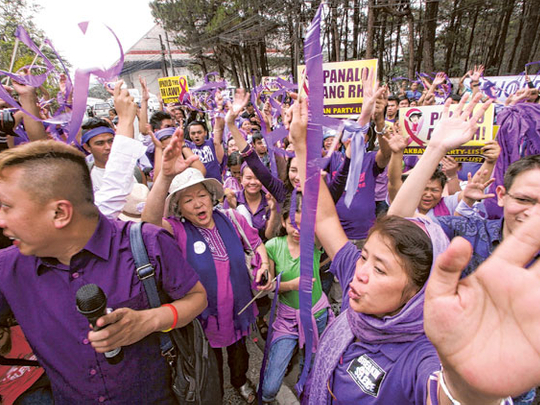
Manila: Millions of poor people in the Philippines will have access to free contraceptives for the first time after the nation’s top court on Tuesday approved a deeply controversial birth control law.
The Supreme Court’s ruling was hailed by supporters as a triumph in the battle to ease crippling poverty, empower women and curtail a population explosion in the Southeast Asian nation of 100 million people.
But the Catholic Church, which had led a bitter campaign for 15 years against efforts to introduce any form of family planning laws, expressed anger and vowed to continue fighting what it terms “evil” reforms.
“The RH law is not unconstitutional,” Supreme Court spokesman Theodore Te told reporters as he announced the ruling, striking down more than a dozen petitions against the reproductive health law from church-backed groups.
The legislation requires government health centres to supply free condoms and birth control pills, as well as mandating that sex education be taught in schools.
It also requires that public health workers receive family planning training, while medical care after an abortion will also be legalised.
The issues are so controversial in the Philippines because nearly 80 per cent of the population are Catholics, an inheritance of three centuries of Spanish colonial rule.
And while Pope Francis has recently urged a break from the Church’s obsession with its ultra-strict dogma, local Catholic leaders have sought to continue with deeply conservative social policies.
The Philippines is the only country where divorce remains illegal. Abortions are also outlawed.
“This monumental decision upholds the separation of church and state and affirms the supremacy of government in secular concerns like health and socioeconomic development,” legislator Edcel Lagman, the main author of the law, said after the ruling.
Women’s rights groups and other supporters of the law said the law would be a powerful tool in cutting the Philippines’ fertility rate of 3.54, one of the highest in Asia that has contributed to the nation’s brutal poverty.
More than a quarter of the population live on the equivalent of 62 cents a day, according to the government, with many million housed in horrific urban slums and unable to afford contraceptives.
“The full and speedy implementation of the law will be critically important in reducing maternal mortality and ensuring universal access to reproductive health care,” the United Nations said in a statement welcoming the ruling.
It noted that the number of women dying while giving birth in the Philippines had remained high over the past two decades, and the nation was expected to miss a 2015 development target to cut maternal deaths to 52 per 100,000 live births.
Between 14 and 15 mothers die each day from complications during childbirth in the Philippines, according to the British medical charity Merlin.
A spokeswoman for Philippine President Benigno Aquino, who defied church threats of excommunication to shepherd the law through parliament in 2012, said the government was ready quickly to start implementation.
The government had been poised to begin implementing it last year, but the appeals to the Supreme Court led to a temporary restraining order.
Nevertheless, the Church and other opponents insisted they would continue campaigning against the law, and potentially lodge an appeal.
Decisions by the Supreme Court can be appealed, but the tribunal rarely reverses its own rulings.
Oscar Cruz, an outspoken senior member of the Catholic Bishops Conference of the Philippines, said approval of the law could “open the floodgates for other un-Catholic laws, like legalising abortion or divorce”.
One of the most hardline opponents and a petitioner to the court, former senator Francisco Tatad, said allowing the law to take effect could force Catholics into open revolt.
“This means civil disobedience at the very least, actual revolt at the most extreme,” Tatad wrote in a commentary in the Manila Times on Tuesday ahead of the ruling.
Church leaders have helped lead two revolutions that toppled unpopular presidents in recent history.
However church-backed groups have not attracted massive crowds to previous rallies against the law.
Polling over many years has also shown that most Catholic Filipinos have largely embraced less conservative views on social issues.
A survey last month by the respected Social Weather Stations polling group said 72 per cent of respondents were in favour of the law.












